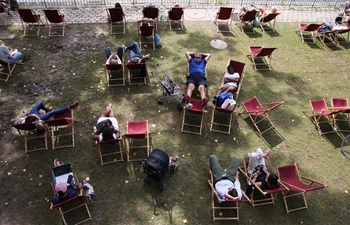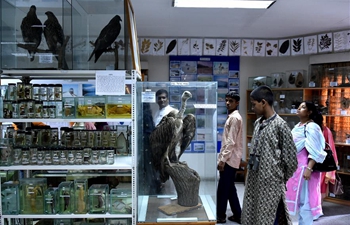by Nick Kolyohin
JERUSALEM, July 19 (Xinhua) -- Israel's Tel Aviv Museum of Art launched on Thursday a unique exhibition about cities struggling with global warming, in hope to stress the urgency of the coming crisis.
The exhibition, named Solar Guerrilla: Constructive Responses to Climate Change, emphasizes what cities and their residents can do before it would be too late.
The museum's statement said that it is the first art museum exhibition of its kind in the world to address the issue of climate change from the perspective of cities as tools to promote a change.
Maya Vinitsky, exhibition curator, told Xinhua that "we live in a time when extreme climatic phenomena are breaking records, and projects to deal with them are being multiplied in various cities around the world."
"At the exhibition, we choose to present the city as an optimal tool to cope with climate change," Vinitsky added.
The exposition which consists of six thematic sections with highlights of case studies from Israel and around the world will be open for visitors from July 18 to Dec. 15.
Accessible sources of green and renewable energy to the urban population, decreasing emission of polluting gasses, and reducing the ecological footprint, are among the ideas of the exhibition.
Climate change is becoming an urgent matter in Israel and around the world. Although there are disbelievers, most of the international community agree that it is a significant threat on the future of the planet.
Professionals from around the world, commercial companies as well as public and private institutions are collaborating to tackle climate change.
There are 35 case studies from around the world displayed on the exhibition, including studies from cities of New York, Chicago, Copenhagen, Shanghai, Singapore and Tel Aviv.
"Extreme climate events, which are growing frequently, are among the most urgent concerns currently faced by our world," said Tania Coen-Uzzielli, director of Tel Aviv Museum of Art.
Climate change is influenced by natural forces and human actions and it affects not just the environment, but also a wide range of matters such as social, political and economic fields.
Efficient solutions to climate change concerns may be found on a local level, where the engagement of urban communities may prove to be effective in combating environmental damage, according to the exhibition's statement.
In Israel, there is a growing trend of constructing sustainable buildings much more energy-efficient, less heated up during summer or cooled during winter.
Sustainable building models shown at the exhibition have lots of trees growing on the balconies, walls, and roofs, making better air in the cities suffering pollution, and cooling down the temperature.
Orli Ronen, head of the urban sustainability and innovation lab, at the Porter school for environmental studies, Tel Aviv university, said that cities should adapt themselves to the coming climate change.
The world is changing now and cities are going to be hotter, the storms becoming stronger and there are climate phenomena in places that have never accrued before, Ronen said in an interview with Xinhua.
Extreme weather could also mean colder winters, sea-level rise, cyclones occurrence in a completely new place, according to Ronen.
Future cities could be planned and constructed almost completely in a sustainable way that would allow them to provide themselves, and effect much less on the health of planet.

















